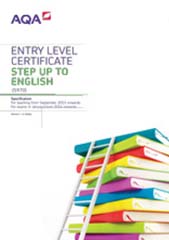General administration
You can find information about all aspects of administration, as well as all the forms you need, at aqa.org.uk/examsadmin
Entries and codes
You only need to make one entry for each qualification – this will cover all the non-exam asssessment and certification.
Every specification is given a national discount (classification) code by the Department for Education (DfE), which indicates its subject area.
| Entry title | AQA entry code |
|---|---|
| ELC Step Up to English Silver Step | 5972 |
| ELC Step Up to English Gold Step | 5973 |
Both of these entry options will lead to the same qualification. The title of the qualification is AQA ELC Step Up to English.
This specification complies with Ofqual’s:
- Criteria for Entry Level qualifications
- General conditions of recognition that apply to all regulated qualifications
- all other relevant regulatory documents.
Availabilty of tasks and certification
For security purposes, externally-set tasks will be available on e-AQA. The tasks are not timetabled, but are done at a time chosen to suit the school or college. The tasks should be kept under secure conditions when not in use.
Certification for this specification is available for the first time in June 2016 and then January and June for the lifetime of the specification.
Overlaps with other qualifications
There is some overlap with AQA’s ELC Adult Literacy (until June 2016) and AQA’s Functional Skills English at Entry 1/2/3 (until June 2017) qualifications.
Awarding grades and reporting results
The qualification will be graded and awarded at Entry 1 or Entry 2 for students entered for Silver Step and at Entry 3 for students entered for Gold Step.
Students who fail to reach the minimum standard for the step at which they are entered will be recorded as U (unclassified) and will not receive a qualification certificate.
GCSE-ready descriptors are included in this specification. The qualification cannot be awarded at this level but the descriptors can be used by teachers as a diagnostic tool to identify when a student may be ready to move on to GCSE.
Re-sits and shelf life
Students can re-sit the qualification as many times as they wish, within the shelf life of the qualification.
Previous learning and prerequisites
There are no previous learning requirements. Any requirements for entry to a course based on this specification are at the discretion of schools and colleges.
Access to assessment: diversity and inclusion
General qualifications are designed to prepare students for a wide range of occupations and further study. Therefore our qualifications must assess a wide range of competences.
The subject criteria have been assessed to see if any of the skills or knowledge required present any possible difficulty to any students, whatever their ethnic background, religion, sex, age, disability or sexuality. If any difficulties were encountered, the criteria were reviewed again to make sure that tests of specific competences were only included if they were important to the subject.
As members of the Joint Council for Qualifications (JCQ) we participate in the production of the JCQ document Access Arrangements and Reasonable Adjustments: General and Vocational qualifications. We follow these guidelines when assessing the needs of individual students who may require an access arrangement or reasonable adjustment. This document is published on the JCQ website at jcq.org.uk
Students with disabilities and special educational needs
We are required by the Equality Act 2010 to make reasonable adjustments to remove or lessen any disadvantage that affects a student with a disability and/or special educational needs. We can make arrangements to help students access the assessments, as long as the competences being tested are not changed.
Please note for ELC Step up to English:
- a human reader is not allowed to read questions or text in papers (or sections of papers) that test reading.
- a computer reader can be used where it is a student’s normal way of working.
- a scribe or speech recognition technology is not allowed for papers (or sections of papers) that assess writing.
- schools and colleges can provide a word processor, with spelling and grammar check/predictive text switched off, where it is a student’s normal way of working.
For further information see our Notes and guidance: non-exam assessment and Joint Council for Qualifications (JCQ) access arrangements and reasonable adjustments guidelines.
Special consideration
We can give special consideration to students who have been disadvantaged at the time of the assessment through no fault of their own – for example a temporary illness, injury or serious problem such as the death of a relative. We can only do this after the assessment.
Your exams officer should apply online for special consideration at aqa.org.uk/eaqa
For more information and advice about access arrangements, reasonable adjustments and special consideration please see aqa.org.uk/access or email accessarrangementsqueries@aqa.org.uk
Safeguarding
Some of the content within this curriculum may generate discussions or disclosures from students which raise safeguarding concerns. If this happens, please follow your centre’s safeguarding policy to arrange support.
Working with AQA for the first time
If your school or college has not previously offered any AQA specification, you need to register as an AQA centre to offer our specifications to your students. Find out how at aqa.org.uk/becomeacentre
Private candidates
A private candidate is someone who enters for exams through an AQA-approved school or college but is not enrolled as a student there.
This specification is not available to private candidates.
